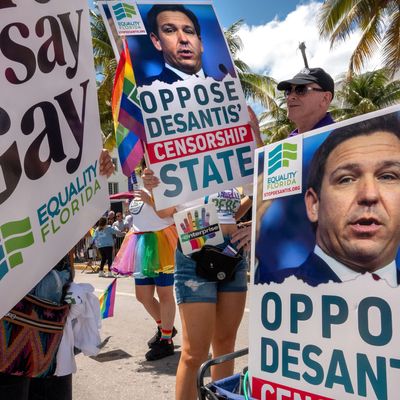
Ron DeSantis may be looking beyond the Florida-Georgia line for the 2024 election, but the damage he let loose this week could be impacting the state for years to come.
Florida’s culture-war governor signed a law on Friday canceling the de facto tax benefits in the state for the Walt Disney Company, which spoke out against the “Don’t Say Gay” legislation barring public schools from “encouraging” classroom discussions on gender identity. The message is clear: Pro-business protections are now conditioned upon businesses accepting the governing party’s reactionary leanings. But the intended targets inside the Cinderella Castle may not be the Floridians actually getting hurt by the authoritarian move.
The new law gets rid of Disney’s special improvement district, a catered tax setup established in 1967 which allows the company to run its own fire department and sewer services. Now, the protected area known as the Reedy Creek Improvement District will dissolve in June 2023 — and it appears that the House of Mouse won’t be paying the price. As the arrangement currently stands, Disney is basically allowed to tax itself to pay for utilities and infrastructure; according to the tax collector for the adjacent Orange County, the Reedy Creek Improvement District brings in around $105 million per year in general revenue, in addition to tens of millions in annual property taxes.
When the district turns into a pumpkin next year, residents in nearby Orange and Osceola Counties must pitch in for the maintenance of utilities, waste management, and emergency services inside the 25,000-acre theme park attended by over 58 million visitors each year. More importantly, local governments will become responsible for Reedy Creek’s liabilities, including roughly $1 billion in outstanding bonds, which could mean additional debt burdens as high as $2,800 for a family of four in Orange County, according to the local ABC affiliate. “I don’t see how Orange County doesn’t raise property taxes by 20 percent to 25 percent,” the local tax collector Scott Randolph said.
Could it hurt DeSantis? Raising taxes in one of the state’s most populous counties in an election year is typically not a savvy political move, but any immediate blowback will likely be shouldered by the governor’s popularity in the state, according to recent polls. The real remaining question is whether or not the gamble works: Will other companies headquartered in Florida avoid a clash with the nation’s most powerful Republican governor, sticking to signing tepid petitions condemning anti-LGBT legislation? DeSantis intends to find out at the expense of the local taxpayer.
As the war on Big Mouse captures attention across the country, DeSantis signed another bill on Friday that will reshape Floridian politics for the next decade. That legislation warps the state’s districts to favor Republicans’ chances in as many as four new seats and isolates Democratic control in the cities. Though Democrats intend to sue, it may come too late for the August primary.






























